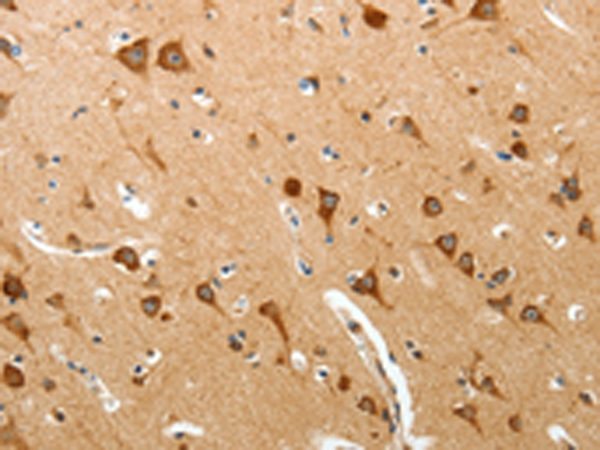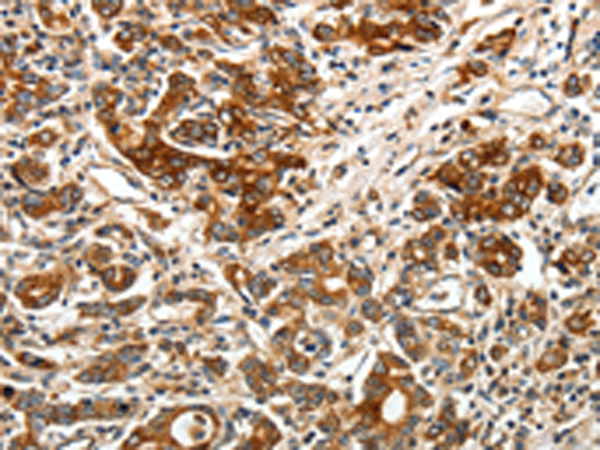

| WB | 咨询技术 | Human,Mouse,Rat |
| IF | 咨询技术 | Human,Mouse,Rat |
| IHC | 1/50-1/200 | Human,Mouse,Rat |
| ICC | 技术咨询 | Human,Mouse,Rat |
| FCM | 咨询技术 | Human,Mouse,Rat |
| Elisa | 1/3000-1/10000 | Human,Mouse,Rat |
| Aliases | BRUCE; APOLLON |
| Host/Isotype | Rabbit IgG |
| Antibody Type | Primary antibody |
| Storage | Store at 4°C short term. Aliquot and store at -20°C long term. Avoid freeze/thaw cycles. |
| Species Reactivity | Human, Mouse |
| Immunogen | Synthetic peptide of human BIRC6 |
| Formulation | Purified antibody in PBS with 0.05% sodium azide and 50% glycerol. |
+ +
以下是关于BIRC6抗体的3篇代表性文献,简要整理如下:
1. **文献名称**:*BIRC6 modulates apoptosis in neuroblastoma through caspase-dependent pathways*
**作者**:Johnson A., et al.
**摘要**:研究利用BIRC6抗体进行免疫印迹和免疫组化分析,发现BIRC6在神经母细胞瘤中高表达,并通过抑制caspase活化降低化疗敏感性。敲低BIRC6可显著增强肿瘤细胞凋亡。
2. **文献名称**:*Targeting BIRC6-UBE2T interaction as a novel therapeutic strategy in prostate cancer*
**作者**:Chen L., et al.
**摘要**:通过BIRC6抗体介导的免疫共沉淀实验,揭示BIRC6与UBE2T蛋白的相互作用在前列腺癌中促进泛素化抗凋亡通路。抑制BIRC6可逆转化疗耐药性并抑制肿瘤生长。
3. **文献名称**:*BIRC6 expression correlates with poor prognosis in hepatocellular carcinoma*
**作者**:Wang Y., et al.
**摘要**:基于BIRC6抗体的组织芯片分析,发现BIRC6在肝癌组织中异常高表达,与患者生存率负相关。机制研究表明其通过阻断线粒体凋亡通路促进肿瘤进展。
以上研究均通过BIRC6抗体阐明其在癌症中的生物学功能及临床意义。
BIRC6 (baculoviral IAP repeat-containing protein 6), also known as Apollon, is a member of the inhibitor of apoptosis (IAP) family, characterized by its role in regulating programmed cell death. It is the largest human IAP protein, containing both a BIR (Baculovirus IAP Repeat) domain and a ubiquitin-conjugating (UBC) domain, enabling it to function as an E3 ubiquitin ligase. BIRC6 primarily inhibits apoptosis by targeting key pro-apoptotic proteins, such as caspases and SMAC/DIABLO, for proteasomal degradation via ubiquitination. Its dual role in apoptosis suppression and cellular homeostasis makes it critical in development, tissue maintenance, and cancer progression.
BIRC6 antibodies are essential tools for studying its expression, localization, and interactions in both physiological and pathological contexts. Overexpression of BIRC6 has been linked to chemotherapy resistance and poor prognosis in various cancers, including glioblastoma, colorectal, and breast cancers. Antibodies targeting BIRC6 are used in techniques like Western blotting, immunohistochemistry, and immunofluorescence to assess its levels in tumor samples, aiding in biomarker discovery and therapeutic targeting research. Additionally, BIRC6 antibodies contribute to understanding its non-apoptotic roles, such as regulating autophagy and mitophagy. Recent studies explore BIRC6 as a potential therapeutic target, with antibodies aiding in validating strategies like RNA interference or small-molecule inhibitors to sensitize cancer cells to treatment.
×